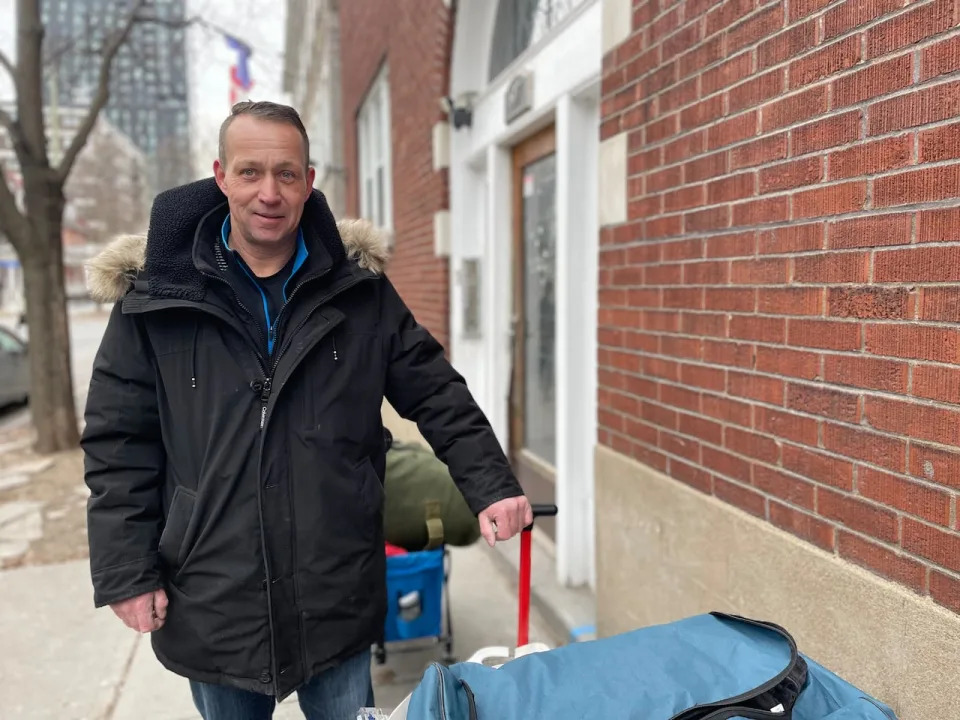 With a wagon full of sandwiches, juice and clothing trailing behind him, Gerald Jorgensen walks the downtown Ottawa streets where he says he’s died and been revived a dozen times.
With a wagon full of sandwiches, juice and clothing trailing behind him, Gerald Jorgensen walks the downtown Ottawa streets where he says he’s died and been revived a dozen times.
The 54-year-old recovering addict says he was homeless, pushing around a shopping cart and unwilling to make eye contact with others when he decided he’d had enough in early January 2023.
“I actually hadn’t eaten in a week. I hadn’t drank any water in three days,” Jorgensen said. “I was 145 pounds, addicted to fentanyl and was so weak I could hardly walk.”
Jorgensen says it was a Salvation Army housing worker’s help that enabled him to get out of that place. Now a Christian, he says faith also played a role.
But more than a year after leaving the streets, Jorgensen has returned to them — not because of a relapse but because it’s his own personal way of giving back.
‘Not here to save anyone’
Every week, Jorgensen loads up his wagon with food and other supplies and walks the streets, sometimes providing aid to people he knows from his past life.
“What’s really amazing about that is people recognize him,” said Rich Danby, a friend Jorgensen met during his recovery. “They remember him and when they see where Gerald is at now, they’re celebrating it.”
“I’m not here to save anybody,” Jorgensen said. “I know I can’t save anyone, but I’m here to make their day a little better.”
Samantha Fox, who is currently couch surfing and living outside, was with him the day he decided to get clean.
“When he left, he left all his belongings behind. He didn’t take anything with him,” Fox recalled as she stood on Nelson Street on Friday. “And then when I seen him again, he was sober.”
Fox said at that point, she began to cry. While a lot of people talk about getting sober, she said few just walk away and do it.
“I’m so happy that he’s here today,” she said.
“We need a lot of people like him to keep us, you know, feeling like that we can do it or we can make it.”

But Jorgensen said it wasn’t as easy as getting up and walking away.
His road to recovery involved time on his sister’s basement floor, a week in detox and time in a program dedicated to helping stabilize men with substance use problems.
Jorgensen eventually found a Christian-based 12-step program, Jericho Road, that he says has been crucial to helping him stay clean. Now he’s back working construction and has a basement apartment in Manotick.
“I had no belief in religion at that time,” Jorgensen said. “Today I’m a Christian. I believe God saved me out there that day because there was no way I could stop.”
Childhood trauma, setbacks
He attributes his substance use problems to early childhood trauma, and says the death of his mother and a car crash that left his truck totalled started him on a downward spiral.
By age 47, he had no sustainable income. He said he initially became homeless in Brockville, Ont., in 2020, living with various acquaintances before ending up in encampments.
Jorgensen’s journey brought him to a transition home in Ottawa, but when he relapsed he found himself staying most nights at the Tom Brown Arena for four months.
When that temporary shelter closed, it was back to living rough.
The manager of outreach and housing services for the Salvation Army, Mikyla Tacilauskas, said she first met Jorgensen on a cold February night in 2022. He wasn’t wearing boots and was sleeping outside a Westboro business.

She said outreach workers put warm socks on him and tried to convince him to go to a shelter or even the outreach van to warm up. He refused both offers.
Tacilauskas said it was clear Jorgensen was depressed and seemed to have given up.
“Gerald is a very clear example of the importance of community and perseverance,” she said by email. “He needed help, and we were happy to provide it. Now, he is providing help to others in this community.”
As someone who has had “absolutely nobody or nothing,” Jorgensen said he knows what it can mean for someone to stop to talk, provide some food and make a human connection.
He says sometimes when he’s done his rounds, he’ll sit in his car and reflect on how grateful he is to now be able to provide others with that connection.
“For me to come out here and hand out some clean clothes, give some food … and talk to people and meet them where they’re at, can make a big difference in somebody’s day,” he said.
“I know it made a big difference in mine.”
*****
Credit belongs to : ca.news.yahoo.com
 Atin Ito First Filipino Community Newspaper in Ontario
Atin Ito First Filipino Community Newspaper in Ontario






